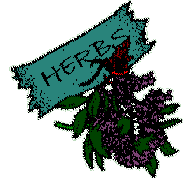 Herbs--C
Herbs--C 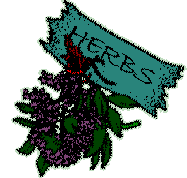
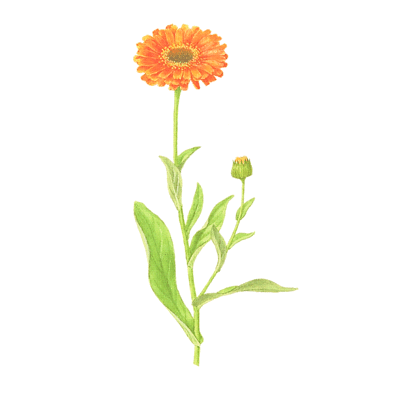 |
Common Names: Calendula Latin Name: Calendula Officinalis Parts Used: Flower petals Cultivation: Calendula prefers full sun, in average soil with a pH of about 6.6. It is a hardy annual, and reseeds readily, so plant it where you want lots of it! Cosmetic Uses: Use an infusion of calendula blossoms to add highlights to your hair. Culinary Uses: The flowers are edible. Use them as garnishes, in salads; or grind and use as a yellow coloring. Magickal Properties: Prophecy, protection, psychic powers. Magickal Uses: Calendula is used for protection and to induce prophetic dreams. Medicinal Properties: Astringent, anti-inflammatory, cholagogue, emmenagogue, tonic, vulnerary. Medicinal Uses: Use tinctures of calendula flower to treat amenorrhea, cramps, toothache, fever, flu, and stomachaches. Apply calendula ointment to sores, cuts, bruises, burns, and rashes. Taken internally it helps treat gastric and duodenal ulcers; and helps relieve gall bladder problems and indigestion. Note:There is a big difference between marigold (tagetes spp.) and pot marigold (calendula officinalis) or calendula. Most entries referring to the magickal or medicinal uses of marigolds are actually referring to calendula. Check the Latin names before using any recipes. |
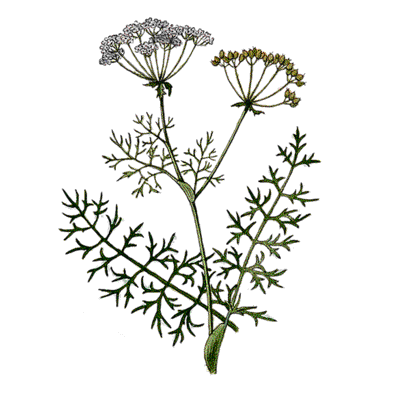
| Common Names: Caraway Latin Name: Carum Carvi Parts Used: Whole plant Cultivation: Caraway is a biennial, hardy to zone 3. It prefers light, dry soil, in full sun to part shade, with a pH of about 6.4. Culinary Uses: The whole plant is edible. Most people are familiar with caraway used in rye bread. You can also use the seeds in egg dishes, beets, fish, potatoes, or in pickling spice. Magickal Properties: Mental powers, protection, lust, health. Magickal Uses: Use caraway to protect against evil spirits. Place in sachets and carry to attract a mate. Bake into breads or cakes to induce lust. A bag of caraway seeds placed in a child's bed protects against disease. Medicinal Properties: Anti-microbial, anti-spasmodic, astringent, carminative, emmenagogue, expectorant, galactagogue, stimulant. Medicinal Uses: Use an infusion of the seeds to treat dyspepsia and colic, especially in children. Caraway is said to stimulate the milk flow in nursing mothers. |
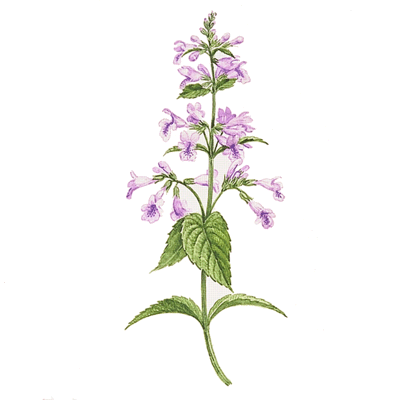 |
Common Names: Catnip Latin Name: Nepeta Cataria Parts Used: Leaves and flowering tops Cultivation: Catnip is a perennial which does not grow easily from seed, but from cuttings. It grows wild around my house! Catnip likes dry, sandy, well-drained soil, in sun to part shade, with a pH of 6.6. It is hardy to zone 3. Magickal Properties: Animal magick, beauty, happiness, love. Catnip is a feminine plant associated with Venus and the element of Water. Magickal Uses: Use with rose petals in love sachets. Catnip enhances beauty and happiness. Grow it near your home to attract good spirits and great luck. Medicinal Properties: Anti-spasmodic, astringent, carminative, diaphoretic, sedative. Medicinal Uses: Catnip tea is used to treat everything from colds to cancer. Common uses are: as a digestive tonic, and mild sleeping aid. Catnip eases upset stomachs. It is good for treating children's diarrhea. |
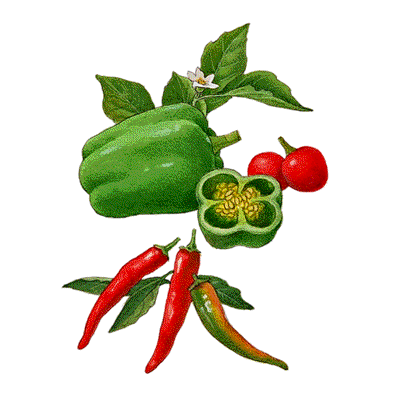 |
Common Names: Cayenne Latin Name: Capsicum Annuum Parts Used: Fruit Cultivation: Cayenne grows best in moist, fertile loam, with a pH of 6.8, in full sun. It is a perennial but is only hardy to zone 10, so it is treated as an annual in the North. Culinary Uses: Add a half-a-pinch of ground cayenne to just about anything. Magickal Properties: Love, hex-breaking. Cayenne is a masculine plant associated with Mars and the element of Fire. Magickal uses: Scatter around the house to break hexes. Use in love sachets. Medicinal Properties: Anti-catarrhal, anti-microbial, carminative, diaphoretic, stimulant, tonic. Medicinal Uses: Contains capsaicin which acts as a restorative digestive tonic. Apply externally as a poultice for painful joints. Cautions: People with intestinal disorders like chronic ulcers or chronic bowel diseases should avoid the use of cayenne in large quantities. |
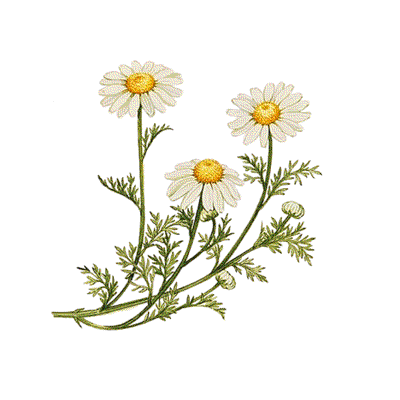 |
Common Names: Chamomile, Camomile Latin Names: Anthemis Nobile (Roman or English Chamomile); Matricaria Recutita (German Chamomile Parts Used: Flowers and leaves Cultivation: Both chamomiles like sandy, well-drained soil, in full sun, with a pH of 6.7-7.0. Roman Chamomile is a perennial, low-growing, and semievergreen plant which makes a good groundcover; German Chamomile is taller and a reseeding annual. Cosmetic Uses: Use an infusion of chamomile to add golden highlight to brown hair, or in a steam facial to help open pores. Magickal Properties: Love, money, purification. Chamomile is a masculine plant associated with the Sun and the element of Water. Magickal Uses: Chamomile attracts money. Use it in sleep and meditation incenses. Take a chamomile bath to attract love. Sprinkle the herb aropund your property to remove curses and hexes. Medicinal Properties: Analgesic, antiseptic, anti-spasmodic, diaphoretic, emmenagogue, nervine, sedative. Medicinal Uses: The volatile oils are an antispasmodic which can be used for treating indigestion and menstrual cramps. It is also an anti-inflammatory and anti-infective useful for treating skin disorders. And who hasn't had a cup of chamomile tea to help her sleep at night! |
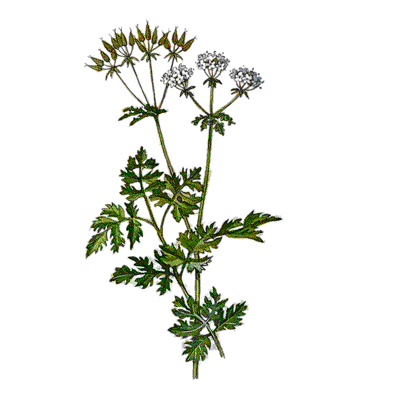 |
Common Names: Chervil Latin Name: Anthriscus Cerefolium Parts Used: Leaves Cultivation: Chervil prefers moist, humous-y soil, in part shade, with a pH of 6.5. It is a hardy annual. Culinary Uses: Chervil is one of the 'fines herbes" of French cooking, along with parsley, thyme, and tarragon. It is also known as the "bean herb" because of its affinity for green beans. Add chervil towards the end of cooking time to keeo it from turning bitter. Medicinal Properties: Diuretic, expectorant, stimulant. Medicinal Uses: Chervil is a diuretic, stimulant, and expectorant. It is used in the treatment of eczema, high blood pressure, gout, and kidney stones. |
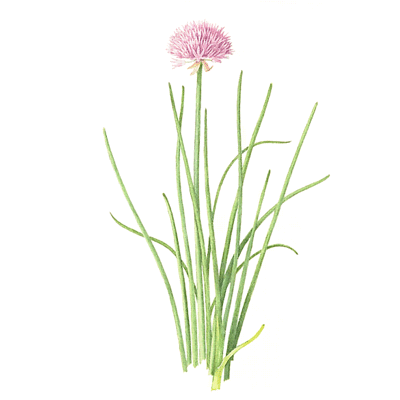 |
Common Names: Chives Latin Name: Allium Schoenoprasum Parts Used: Long tubular leaves Cultivation: Chives like a moderately rich, well-drained soil with a pH of 6. They are sun-loving perennials, and are hardy to zone 3. Culinary Uses: Chives taste like sweet mild onions, and suit just about any flavor. Mince and use as a garnish, or tie whole leaves around steamed carrots or asparagus. Use the flowers as garnish, or in salads and herb vinegars. Medicinal Properties: Mild anti-hypertensive. Medicinal Uses: The sulfur oils found in alliums can help lower high blood pressure, but only in large quantities. |
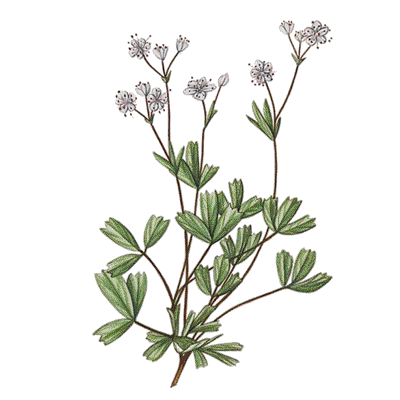 |
Common Names: Cinquefoil, Five Fingers, Crampweed, Silverweed Latin Name: Potentilla spp. Parts Used: Leaves Cultivation: Cinquefoil is a widely used landscaping plant that also comes in a bushy form. It's a perennial, hardy zones 3 - 8, preferring full sun and well-drained soil. Its foliage will show better colors if the soil is kept slightly acid. Magickal Properties: Protection, divination, wisdom, dreams, and clairvoyance. Magickal Uses: Hang cinquefoil over your door to protect your home. Use it in baths, teas, or dream pillows to strngthen the senses and add wisdom and clairvoyance to your dreams. Cinquefoil is an indgredient in some of the ointments used for astral projection. Medicinal Uses: Cinquefoil is an astringent and febrifuge. It is particularly effective against "fever n'ague," malaria, and other fevers associated with warm swampy areas. |
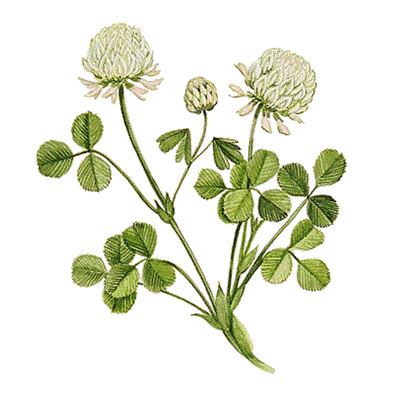 |
Common Names: Clover Latin Name: Trifolium pratense spp. Parts Used: Flower heads Cultivation: Grows wild! Magickal Properties: Exorcism, fidelity, love, money, protection. Clover is a masculine plant associated with Mercury and the element of Air. Magickal uses: White clover is used against hexes; red can aid with finances. A 4-leaf clover protects against madness, strengthens psychic powers, and is thought to lead to gold or treasures. A 5-leaf clover is a very powerful charm for attracting money. Medicinal Properties: Alterative, anti-spasmodic, expectorant, nervine, sedative, tonic. Medicinal Uses: Clover can be used safely to treat skin disorders in children. It is also an expectorant and anti-spasmodic which can be used to treat whooping cough and bronchitis. |
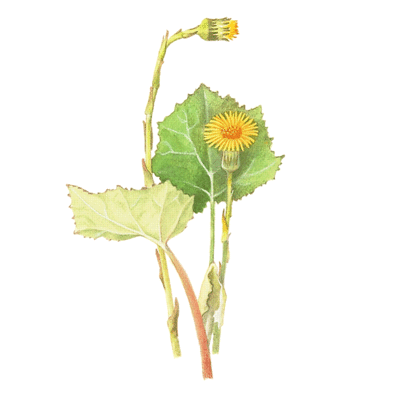 |
Common Names: Coltsfoot, British Tobacco Latin Name: Tussilago farfara Parts Used: Leaves and flowers Cultivation: Coltsfoot does well in moist, averagel soil in full sun; it is hardy to zone 4. Magickal Properties: Love, peace, visions. Coltsfoot is a feminine plant associated with Venus and the element of Water. Magickal Uses: Add to love sachets and use in spells for peace and tranquility. Smoke the leaves to aid in obtaining visions. Medicinal Properties: Anti-tussive, demulcent, diuretic, expectorant, pectoral, tonic. Medicinal Uses: Coltsfoot is a soothing expectorant with anti-spasmodic action, which can be used in the treatment of chronic or acute bronchitis, whooping cough, asthma, and chronic emphysema. It is a mild diuretic. Bruise the leaves and use as a poultice on boils, ulcers, and abscesses. Cautions: Coltsfoot is a suspected carcinogen. Rats fed high concentrations of coltsfoot flowers developed cancer of the liver. |
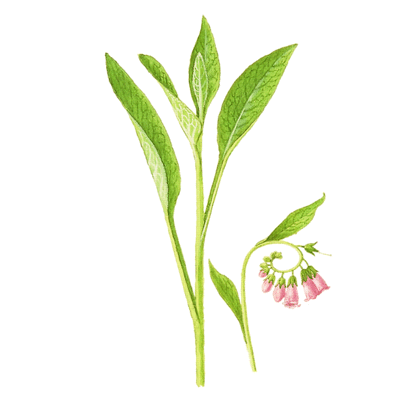 |
Common Names: Comfrey, Boneset, Slippery Root Latin Name: Symphytium Officinale Parts Used: Leaves, roots, and rhizomes Cultivation: Comfrey prefers rich, moist soil in full sun to partial shade. It likes a pH of 7.1 and is hardy to zone 3. Cosmetic Uses: Comfrey soothes and softens, and promotes the growth of new skin cells. Use it in lotions, creams, and baths. Culinary Uses: Comfrey does contain vitamin B12, but you'd have to eat 4 pounds a day to get your USRDA. Magickal Properties: Protection, money. Comfrey is a feminine plant associated with Saturn and the element of Water. Magickal Uses: Carry comfrey for protection during travel. Use the root in money spells. Medicinal Properties: Astringent, demulcent, emollient, expectorant, vulnerary. Medicinal Uses:Use poultices on bruises and sores to aid healing. Comfrey has tissue regenerative and anti-bacterial properties. Use it to treat burns, bed sores, insect bites, eczema, and sprains. Cautions: Comfrey is also a suspected carcinogen. Although it has been found to cause cancer in rats, experts point out that unless you drink 15-20 cups of comfrey tea a day, you are probably not in any danger! |
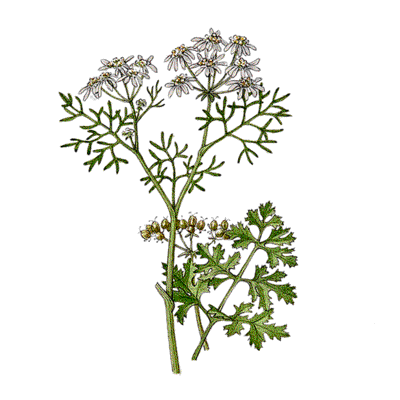 |
Common Names: Coriander, Cilantro, Mexican or Chinese Parsley Latin Name: Coriandrum Sativum Parts Used: Leaves and seeds Cultivation: Coriander prefers moderately rich, well-drained soil with a pH of 6.6. It is a tender annual and grows in full sun to part shade. Culinary Uses: Coriander combines a strong sage flavor with citrus. The leaves are known as cilantro and are used in Mexican, Chinese, and Spanish cooking. Add some to your salsa to get an authentic flavor. The seeds can be used whole or ground. The root is used in Thai cooking. Magickal Uses: Use coriander in love potions and spells. Add coriander seeds to wine or mead to make a love potion. Use the seeds for healing, especially of headaches. Medicinal Uses:Drink an infusion of coriander seeds to settle an upset stomach. make poultices from crushed seeds to relieve the pain of rheumatism. Coriander stimulates the appetite and relieves childrens' diarrhea. |
Herb List A to Z
| A | B | C | D | E | F
| G | H | I | J | K | L | M
| N | O | P | Q | R | S | T | U
| V | W | X | Y | Z |